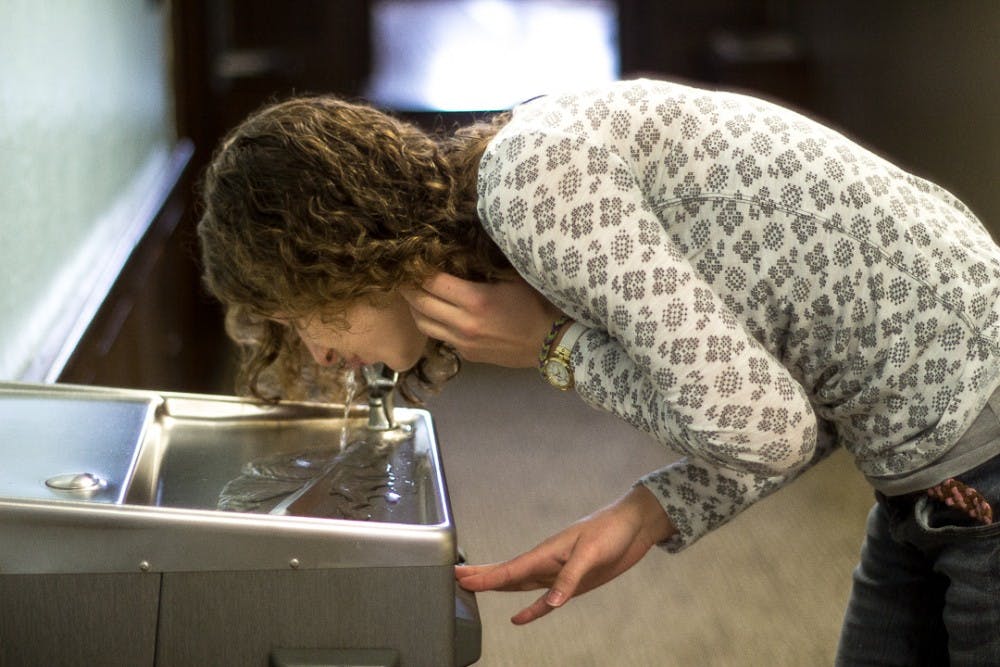The Department of Environment, Great Lakes and Energy (EGLE) announced on Sept. 4 that free well-water testing kits will be available to residents.
However, after only a week, all funding was exhausted.

Civil engineering junior Maria Milan drinks from a water fountain on October 14, 2017 at Williams Hall. The shut down wells did not provide water directly to taps on campus.
The Department of Environment, Great Lakes and Energy (EGLE) announced on Sept. 4 that free well-water testing kits will be available to residents.
However, after only a week, all funding was exhausted.
Last year, EGLE was appropriated a one-time funding of $5 million from Michigan Legislature. The funding made it easier for private residential well owners to test their water quality. Drinking Water and Environmental Health Division Source Water Unit Supervisor Sara Pearson said the testing addresses the basic water concerns such as chloroforms, nitrates, nitrites and metals.
"Our state lab was asked what kind of funding they needed that would help the residents around the state," Pearson said. "The lab routinely receives requests from people who want their wells tested, but it’s cost prohibitive to them. They want to know what's in their water; they want to know their water quality."
Dean Scott, an EGLE spokesman, said they received an “overwhelming response” from Michigan residents regarding free water testing.
“We've already run out of funding for the budgeted $5 million program,” Scott said. “We received 15,000 requests within a week of the Tuesday Sept. 5 announcement.”
Pearson said funding officially ran out on Sept. 12. The 15,000 requests were all for different wells in Michigan.
Unlike community water supplies, well water is not regularly tested. Pearson said wells are only required to be tested for bacterias when they are first installed. She said most large cities in Michigan are on community water and are regulated, but rural and suburban areas with well water are not tested as often as recommended.
Lansing and surrounding areas are on community water supplies. Ruth Kline-Robach, an outreach specialist in the Department of Community Sustainability at MSU, said the greater Lansing area is all drinking groundwater, meaning water comes from aquifers underground.
East Lansing and campus water come from the same place: the Saginaw Formation. Kline-Robach said there are “abundant supplies” of groundwater in greater Lansing areas.
“For the most part, water quality of groundwater in greater Lansing area is pretty good,” Kline-Robach said. “It does tend to have a lot of dissolved minerals in it. It’s what we call hard water, has calcium and magnesium, it's got iron in it. Those types of things are not health concerns; they're more aesthetic problems.”
On-campus MSU students run into two problems: hard water and red water.
“We don't soften it, we don't take the hardness out, the calcium and magnesium and put salt or lyme in like the city of East Lansing does,” Kline-Robach said. “But we are treating now for iron, and that takes some of that objectionable color and taste out of the water.”
The new treatment for iron is the reasoning behind the occasional “Red Water Alert” that students recieve. Kline-Robach said the new system has not completely stabilized, so these alerts come from water mains and pipes being flushed, allowing for the deposited sediment to be removed.
Although free water kits are no longer available, they can still be purchased through EGLE Drinking Water Laboratory. It is still recommended for well water to be tested annually.
“Our lab runs the choloforms for $16, the partial chemistry for $18 and then the metals are, the full metals that we offered are just over $100 each,” Pearson said.
Water quality in Michigan is overall quite good. Pearson said there are some areas that have naturally occurring high arsenic levels, such as Michigan’s thumb area. This is due to the geology in the area, one of the influential factors of well-water quality.
Pearson said there is surety in the water coming from community supplies, but not for wells. She also said the difference between community and well sources "should be quite comparable.”
"We highly recommend that as part of their well maintenance that they do sample their water on a regular basis just so that they know and for peace of mind," said Pearson. "That's what we want people to do. We want people to maintain their wells and know what the quality of their water is so that they are certain that everything is okay because they are their own water operator."
For those that would like to test your well water, contact the local heath department for information on water in your area. Visit the EGLE website to request a water test.
Support student media! Please consider donating to The State News and help fund the future of journalism.